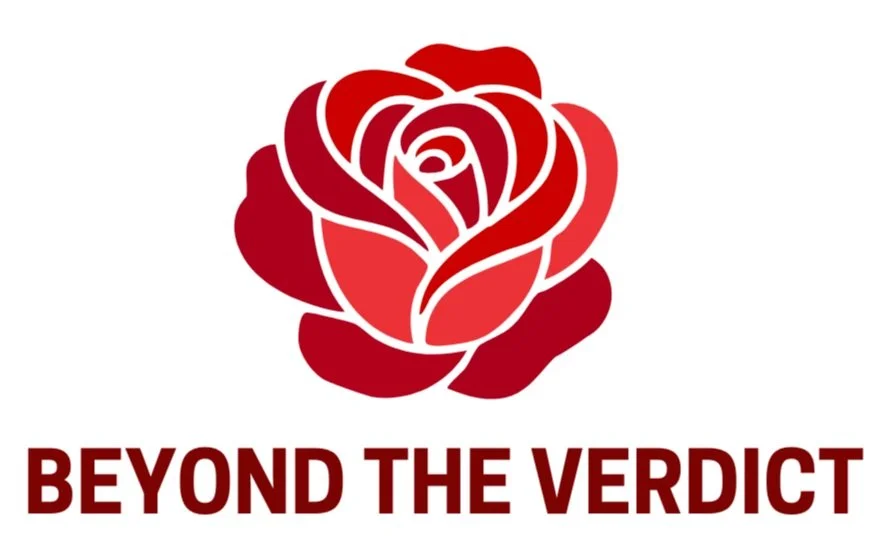Op-Ed: When aggressive tactics are praised as legal strategy, it’s survivors like me who pay the price
An edited version of this Op-Ed was published by the Globe and Mail online and in print in the days leading up to the Hockey Canada verdicts.
By J.B.
J.B. is the “Ottawa woman” who testified against former Hedley frontman Jacob Hoggard in 2022. She recently co-founded Beyond The Verdict, a Canadian survivor-led advocacy group to push back on abusive defence tactics at sexual assault trials.
I know what it’s like to sit in the witness box and have your trauma weaponized against you in front of a courtroom full of strangers. That’s why I’ve been watching the Hockey Canada trial with increasing alarm. With the judge’s decision just days away, I can’t help but reflect on my own experience — and what’s at stake for all of us.
In 2022, I testified against Canadian musician Jacob Hoggard and was cross-examined by Megan Savard, the same defence counsel now representing one of the accused in the Hockey Canada case. Both trials featured aggressive defence tactics that echo the very abuse that complainants come forward to report in the first place.
Complainant E.M. had to face these tactics from five different defence teams. I can only imagine how it must have felt to have her trauma picked apart by a lineup of lawyers, her credibility questioned, her humanity chipped away as they scoffed and laughed.
No matter the outcome of the current trial, the message is already clear: if you dare to speak up, you will be punished.
I’m still in therapy because of what I endured in that courtroom. I actually regret participating in the legal process at all—even though Mr. Hoggard was ultimately found guilty in relation to my assault. And I know I’m not alone in that regret.
For survivors, testifying is not just about reliving the assault. It’s about surviving the trial itself. That’s why rape shield laws exist: to protect us from being re-traumatized by abusive defence tactics and allow us a sliver of dignity and privacy. In theory, anyway.
Instead of following the proper process outlined by the rape shield legislation, the defence ambushed me with a phone call Mr. Hoggard had secretly recorded without my knowledge, arguing it didn’t fall under the rape shield law. The judge did not agree but allowed it, saying she felt backed into a corner. I was forced to listen to a distressing recording with the jury watching, as I trembled and sobbed. Ms. Savard told them I was reacting that way because I’d been “caught in a lie.”
That was just the first incident. Before the trial, I had given an interview to the CBC with my identity disguised. Ms. Savard confronted me with two clips from the CBC, both of which showed an interviewee with an obscured identity recounting details of an alleged incident of sexual misconduct by Mr. Hoggard. The information given in one of the clips did not match the details of my earlier testimony. Ms. Savard repeatedly insisted that the person in that clip was me, arguing that it was proof I had lied to the jury. Under intense pressure, I eventually broke down and conceded she must be right.
Unbeknownst to me, the two clips played in court were of two different interviewees, and the clip that didn’t match my earlier testimony was not from my interview; it was of someone who wasn’t even part of the trial.
When the defence’s mistake was revealed by a CBC producer, Ms. Savard offered no apology or expression of remorse for the additional - and unnecessary - trauma it caused me. In fact, Ms. Savard argued that the jury shouldn’t even be told that the judge offered me an apology - because it could portray her client Mr. Hoggard in a negative light.
After the judge acknowledged the error in court and told the jury to disregard it, the defence attempted to bypass another rape shield law. The judge shut it down, but by that point it was clear that there are few consequences for counsel crossing the line - only possible rewards. The complainant is simply collateral damage.
My cross-examination was one of the most traumatizing experiences of my life. Ms. Savard leveraged it to attract more high-profile male clients, and recently tried to frame it as aligned with the prison abolition movement. Ironically, abolition seeks to end systems of harm and reduce state-sanctioned violence—not redirect it to complainants in the witness box.
This isn’t about one lawyer. It’s about a legal culture that rewards cruelty. The Hockey Canada trial is just another example of a survivor being torn apart in the name of aggressive defence strategy while the legal profession cheers it on.
Of course, every accused person deserves a rigorous defence; it’s a cornerstone of our justice system. But as sexual violence expert Elaine Craig argues, a defence lawyer’s obligation to their client shouldn’t extend to subjecting complainants to abusive, humiliating and discriminatory treatment.
We are not adversaries to be crushed. We are not liars to be exposed. Proven false reports of sexual assault are no higher than any other crime.
A good defence lawyer should be able to challenge testimony without dehumanizing us, relying on outdated stereotypes, or trying to find loopholes in rape shield laws. It is possible to respect our dignity and the rights of the accused.
Rape is a violation. The courtroom should not be a place where that violation continues.
I believe that if our justice system requires the public dismantling of a survivor to function, then we need to seriously rethink what we’re calling justice. Until that changes, more survivors will choose silence.
And when silence feels safer than seeking justice, we should all be asking: who is the system really protecting?
